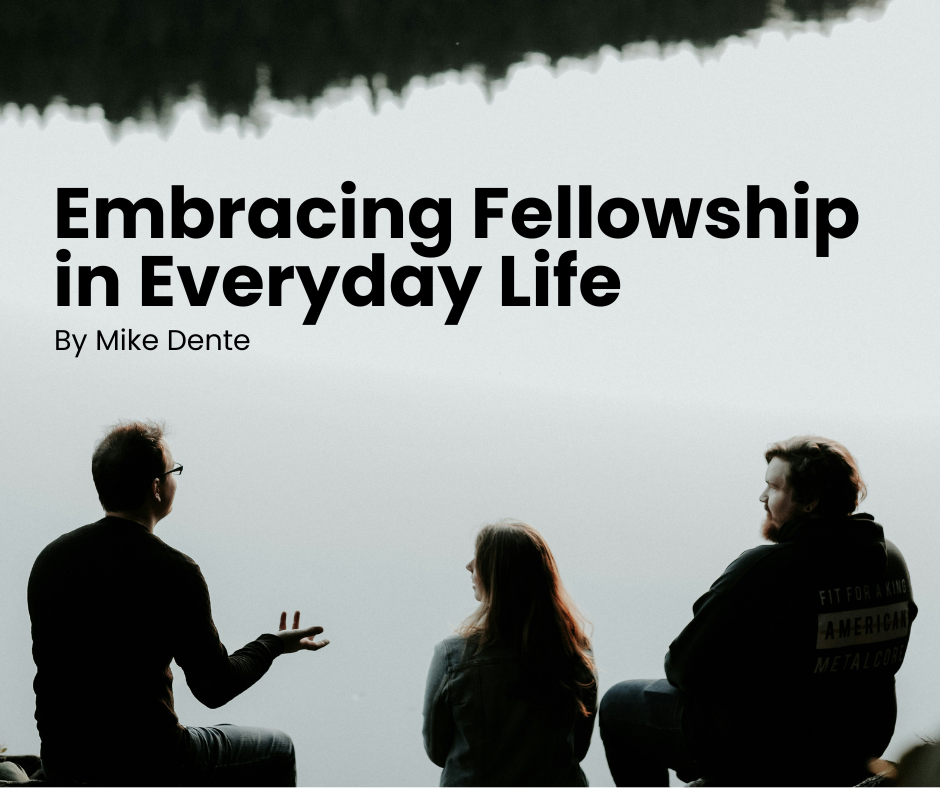
In the everyday moments of city life, I’ve noticed a growing tendency toward individualism and find myself reflecting on the role of Fellowship. Navigating our local church through the post-pandemic landscape, I’ve had conversations with friends worldwide about the place of communion and brotherly love. Beyond the shifts in societal dynamics, Fellowship remains an unwavering priority—proof of its eternal resonance. I realize it’s still on many of our pastoral radars.
How Fellowship Enriches Reality
I noticed this recently during two different events: a pastor’s conference and a seminary class. The subject matter of the two events couldn’t be more different. In one, we were meditating on the Letter to the Ephesians; in the other, the focus was adult learning theory. One was in person, and the other online. And yet something happened in both that ministered to my soul. There was a human connection, sharing, and transparency; there was communion. That moves us beyond pandemics, the business of life, and an ever-changing world, “the family fellowship in the church’s life.”[1]
During these two events, I could share my heart and concerns with others, receive prayer, correction, and encouragement, and then reciprocally give them to others. For those in the ministry, we know how difficult this can be. The fear of being judged and the fierceness of our ambition can become a bulwark against such vulnerability. Yet, in a place of confidence, with mature friends seeking the Lord together, this relationship enriches our lives. This kind of spiritual family drew most of us into the church in our early days of belief. And yet, wasn’t this kind of fellowship supposed to be the norm?
The Reality of Fellowship
We can’t always be in conferences or experiencing exceptional times of fellowship with friends and colleagues. There’s a time for work, there’s a time for Sabbath, and there’s a time for confiding and encouraging. But fellowship is an outflow of the Holy Spirit’s ministry. We see this in a familiar passage to us Calvary-Chaplites, Acts 2:38-42.
As Peter finishes his historic sermon to Jerusalem on Pentecost, he calls his listeners to repentance, as the BDAG says, to feel remorse and be converted. He then urges them to be baptized in the name of Jesus and to receive the Holy Spirit. This (verse 39) was promised to them for as many as “the Lord our God” will call to Himself. That day, 3000 souls responded to the Trinitarian invitation and were brought into fellowship. Why is the Trinity important here? Because of the relationship. The Godhead who lives in perfect relationship, speaking and blessing in the Creation Story, said in Genesis 1:26 (ESV), “Let us make man in our image, after our likeness.” Us. Our image. Our likeness. We were created in the beginning in His image, and in this eloquent passage in Acts, we can observe the Trinity at work in our new birth.
What is the result? Acts 2:42 (Mounce NT), “And they were devoting themselves to the teaching of the apostles, to the fellowship, to the breaking of bread, and prayers.” What I love about this verse is the balance between spiritual and regular human activity. There’s teaching and prayer; there’s fellowship and eating. These activities can and often are included in conferences or church services, but they’re not limited to them. They spill out into the everyday world by the power of the Holy Spirit. In this way, I believe that fellowship should be the norm. Here’s an example by Enoch Wan.
Fellowship is Christian Reality
In much of his writing on Christian adult education theory, Dr. Enoch Wan developed a concept he calls “Relational interactionism.”[2] I want to concentrate on a few of its applications for our purposes here because I believe it’ll help us. The first concerns reality: reality isn’t what our senses perceive; it’s not what society imposes on us, not wholly based on our history or what was done to us. The ultimate reality is God Himself. He’s the Creator of all, and our movement and being are all in Him. Everything moves from Him. That’s what Wan is getting at. If we empty all we know of the existence, there’d still be God because He’s the starting point. This means all we perceive, even through our senses, eyes, hands, noses, etc., is within a larger world created by God. This is important because of the implications. It’s like an escape game. If the players keep in mind this is just a game created for entertainment by someone they don’t know, they’ll have an exciting experience. If they mistake the game for an emergency crisis, they’ll never see the fun they intended to have, even if they solve the mystery. Knowing God is the foundation of our lives, leading us to understand Him as the ultimate reality.
The following application is about relationships. As we pointed out, God, in His tri-unity, was, is, and forever will be. The relationship begins with Him and then flows down to us. When we’re born again, we’re born of the Spirit, made alive in Christ, and adopted as a child of the Father. He’s our lifeline. But the relationship doesn’t stop there. It continues to flow as a river over and through all our relationships. As Dietrich Bonhoeffer said, we know and interact with each other through Christ; just as we can only know God through Christ, we can only know others through Him.[3] Thus, we live, first of all, in a vertical relationship with God. He’s above all and lives in us; there’s this ebb and flow of prayer and communion with Him in our existence. Next, that same relationship doesn’t stay locked up in a never-ending flow between us and God. He’s put us in contact with other people. Our relationship with God flows down to empower our relationships with others in a horizontal movement. This means that reality is God; our reality, relationally speaking, is our relationship with Him and how we relate to others. Fellowship is a massive part of the Christian reality; we should be concerned as we fight to keep it.
I find this all the more persuasive as I think about the communal nature of Jesus’ crucifixion. Though horrifically degrading, dehumanizing, and demonic as a form of execution, it was chosen for the Savior by the Father for our redemption (Psalm 22, 1 John 2:1-2, Rev 13:8). And yet, the Chosen One, while hanging on the Cross, brought a man into salvation (Luke 23:39-43), cared for His mother (John 19:26-27) and openly prayed to the Father (Matt 27:46, Luke 23:34, 46). However, what inspires me is knowing that all those conversations on the cross have been brought to an even more excellent place in the light of the Resurrection. Jesus is our life; through His resurrection power, we can know true fellowship. In this way, we see Enoch Wan’s vertical and horizontal relationships and, more importantly, the reality of fellowship. This is how we were meant to live in fellowship, following Jesus.
References
[1] Geoffrey W. Bromiley, ed. Theological Dictionary of the New Testament (TDNT) “Little Kittel,” (Grand Rapids, MI: William B. Erdmans Publishing, 1985), 450. Fellowship in Gal. 2:9 shaking hands expresses the full fellowship of a common faith in Christ. In Acts 2:42, koinōnía denotes not the Christian society nor its community of goods, but the family fellowship established and expressed in the church’s life.
[2] Enoch Wan and Jon Raibley, Transformational Change in Christian Ministry, 2nd ed. (Stanford, CA: Western Academic Publishing, 2022), 19.
[3] Dietrich Bonhoeffer, Life Together: Paper One Reedition of the 1954 Classic (New York: Harper One, 2005),, 23-24.







